SteelSeries Apex Pro Mini vs Razer Huntsman Mini Analog - which should you buy?
Adjustable switches are hitting the market - and we're comparing the two mini models currently offering them
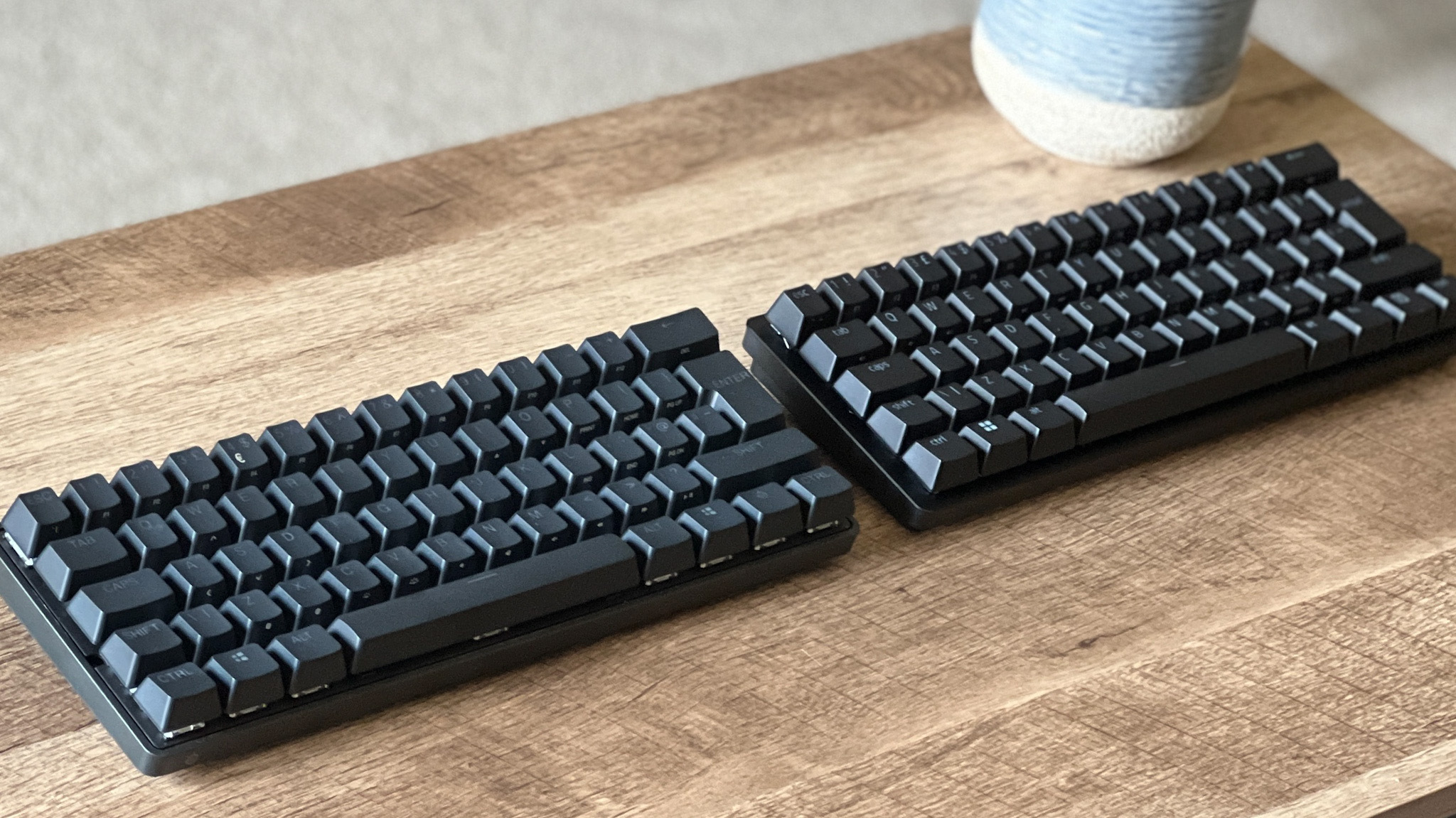
Keyboard switches are changing and Razer and SteelSeries are both marching out new adjustable switch formats across their Huntsman and Apex Pro releases. Razer's Analog Optical switches are available in the Huntsman V2 Analog and the Huntsman Mini Analog, and SteelSeries has recently upgraded its Omnipoint switches to 2.0 for the release of its Apex Pro Mini deck.
These miniature gaming keyboards are the newest models to feature the adjustable clickers from both brands, but if you're looking to tinker with the actuation of your 60% keyboard, the differences between these two models might not be obvious at first glance. Both the SteelSeries Apex Pro Mini and Razer Huntsman Mini Analog look identical initially, but under the hood there's a lot separating these decks.
We're taking a deep dive into the Apex Pro Mini vs Huntsman Mini Analog debate right here, putting both brands' switches to the test and comparing notes across overall value, performance, design, and feature sets as well.
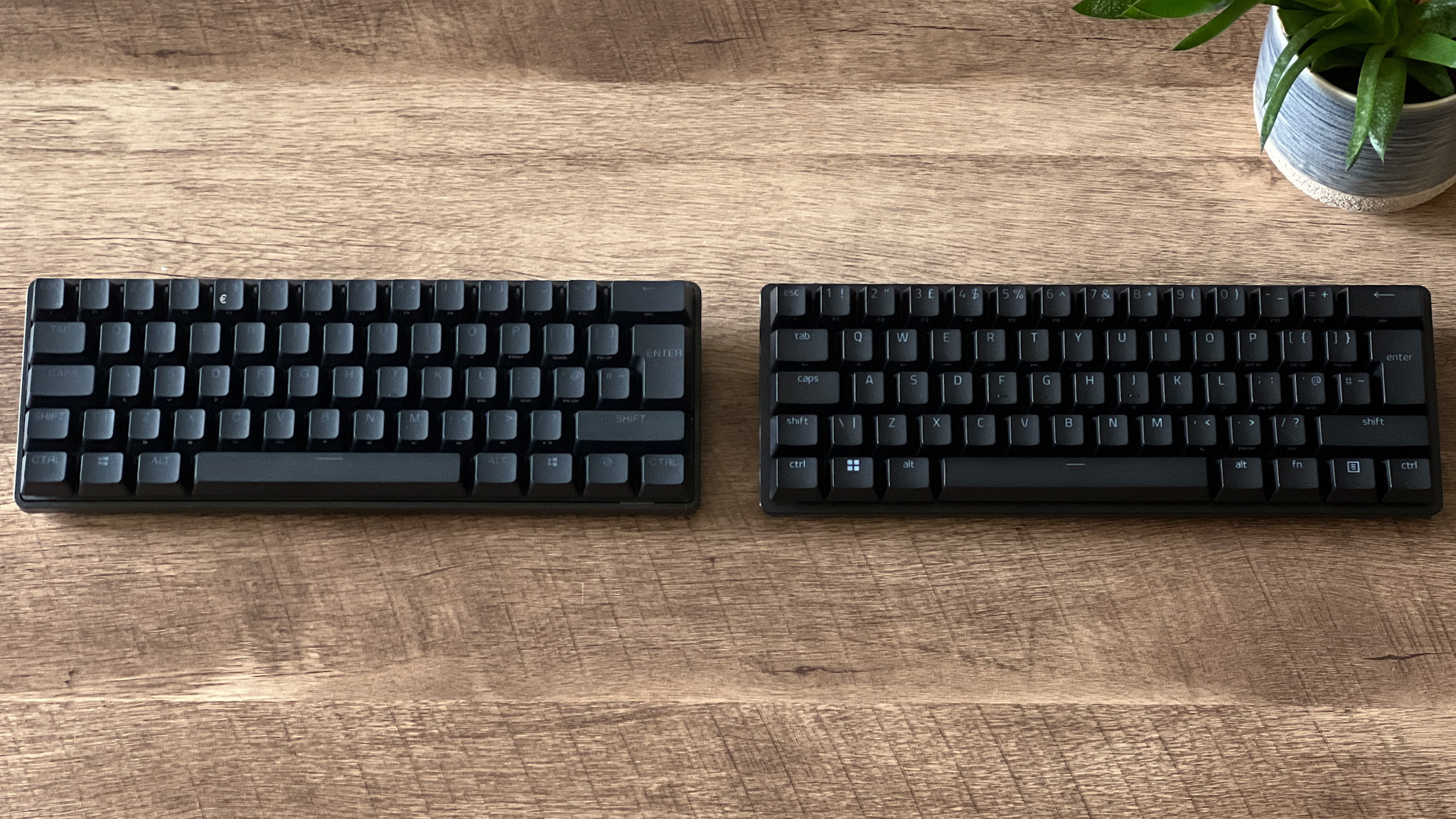
TL;DR - SteelSeries Apex Pro Mini vs. Razer Huntsman Mini Analog
SteelSeries Apex Pro Mini
- More expensive
- Wireless option available
- Wider range of actuation points
- Dual step actuation
- No analog input
- Quieter switches
- Less resistance in typing
- Higher elevation
- Heavier
- Wide RGB light bleed
Razer Huntsman Mini Analog
- Cheaper
- No wireless option
- Smaller range of actuation points
- Dual step actuation
- Analog input
- Slightly louder switches
- More resistance in typing
- Lower elevation
- Lighter
- Less RGB light bleed
Price
The SteelSeries Apex Mini launched at a slightly higher price point than Razer's Huntsman Mini Analog. The wired version of the Apex Mini comes in at $179.99 / £174.99, compared to Razer's $149.99 / £149.99. The $30 difference here is particularly notable, though. As we'll see below, there are certain features baked into Razer's offering that just don't appear in the Apex Mini. That's a bad sign for a price point. However, if you're intent on going wireless then you're sticking with SteelSeries here - the Huntsman Mini Analog doesn't offer an untethered option, though here's the cold water - the Apex Pro Mini Wireless comes in at a hefty $239.99 / £219.99.
Winner - Razer
Switches
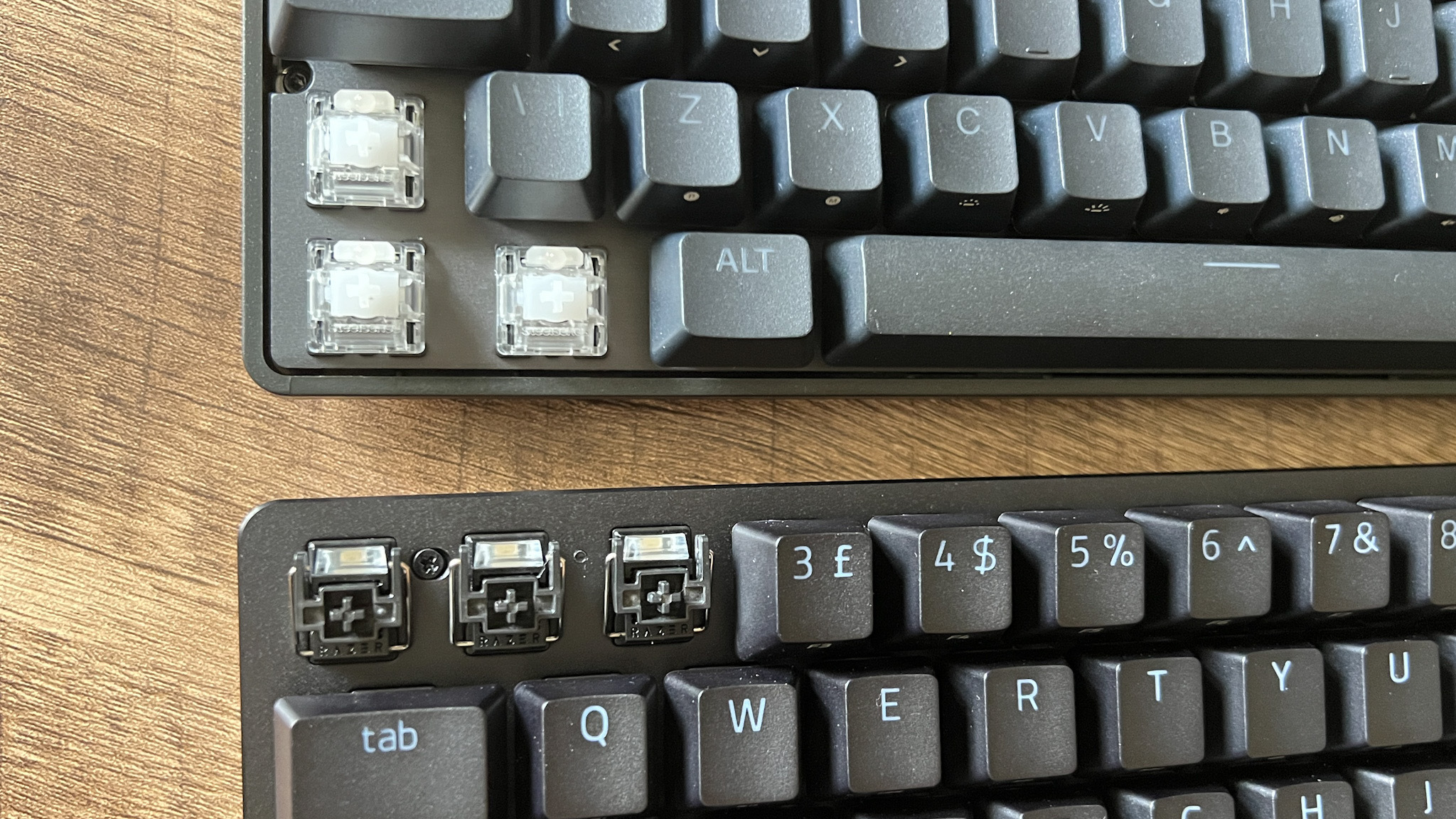
Now down to the main point of both of these keyboards - the adjustable switches. Razer uses its Analog Optical switches in the Huntsman, offering a light-based actuation method whereas SteelSeries has opted to keep things mechanical, with its Omnipoint 2.0. The new Omnipoint switches add the ability to customize dual-step actuation (you can configure one action to a half press, and another action to a full press, for example).
The biggest difference between these switches lies in that key 'Analog' element. While both models allow you to set those dual-step actuations and customize the individual actuation points of each key, the Huntsman Mini Analog goes one step further. Razer's deck can mimic the movement style of a thumbstick by measuring the distance a key is pressed on an - you guessed it - analog level. That means you've got more degrees of movement with each keypress (the more you press, the faster you accelerate in Forza, for example).
Weekly digests, tales from the communities you love, and more
SteelSeries is still very much an on-off switch, just one with a configurable distance before you actuate. That's a big drawback for the Apex Pro Mini, as the overall effect with a set of Huntsman keys underhand can completely change the way you play.
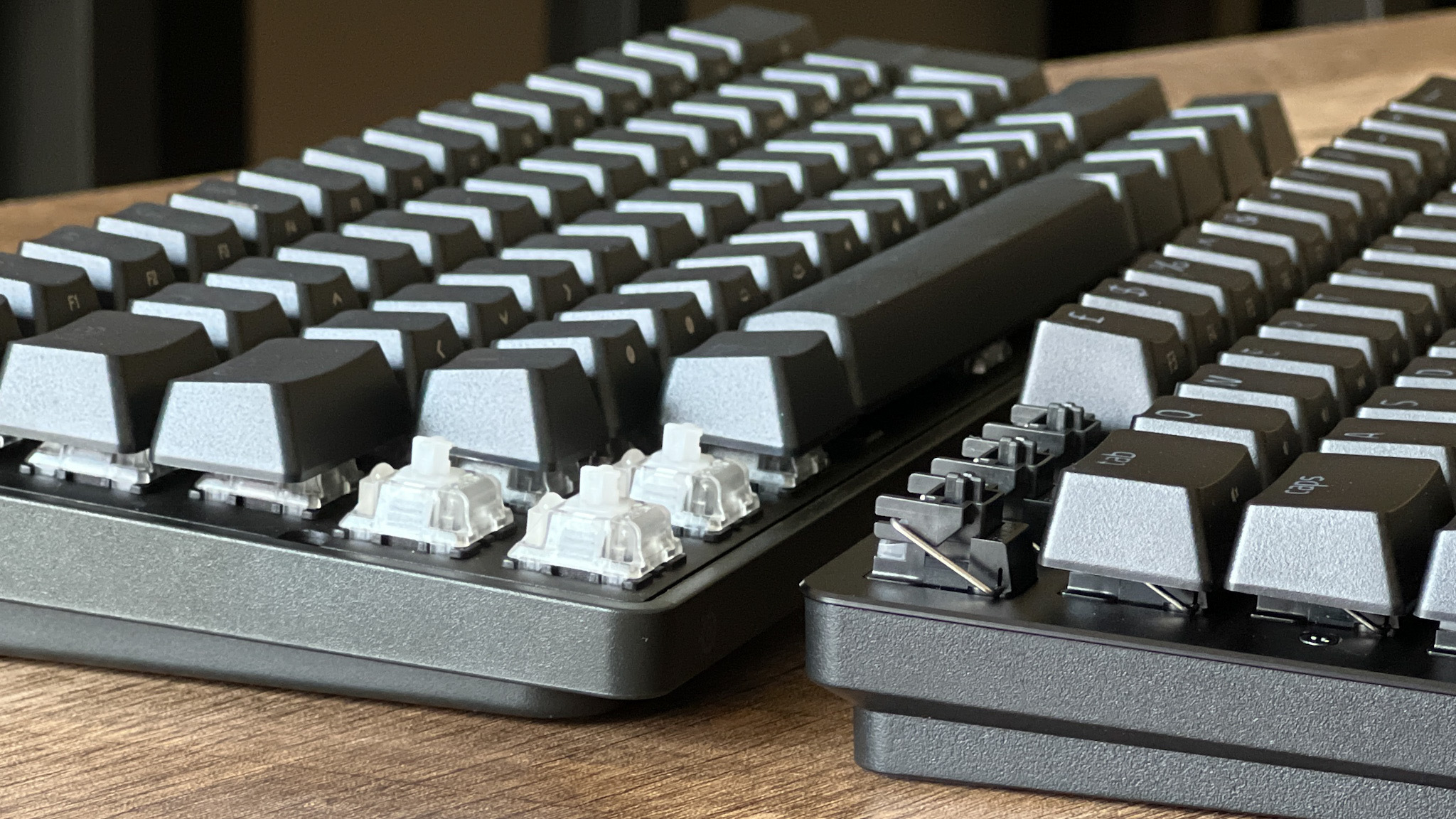
However, if you're not concerned about that variable actuation performance, we'd recommend taking another look at the Apex. SteelSeries offers a far greater range of actuation points to choose from - measuring from a featherlight 0.2mm to a chunky 3.8mm compared to Razer's 1.5mm to 3.6mm. That's certainly not to be discounted in the Razer Huntsman Mini Analog vs SteelSeries Apex Pro Mini debate. This deck is capable of moving much faster than Razer's - perfect for those playing in more competitive scenes.
In our own testing, we did find that Razer's keys have a weightier resistance to them. However, a quick snap back and a lightning-fast response meant that such tension made every keypress a little more satisfying than that of SteelSeries. However, we also found that the Apex Pro Mini carries a much quieter sound quality to it, with a more pleasing dampening to each click (compared to a noticeable echo in Razer's chassis).
Winner - Razer
Design
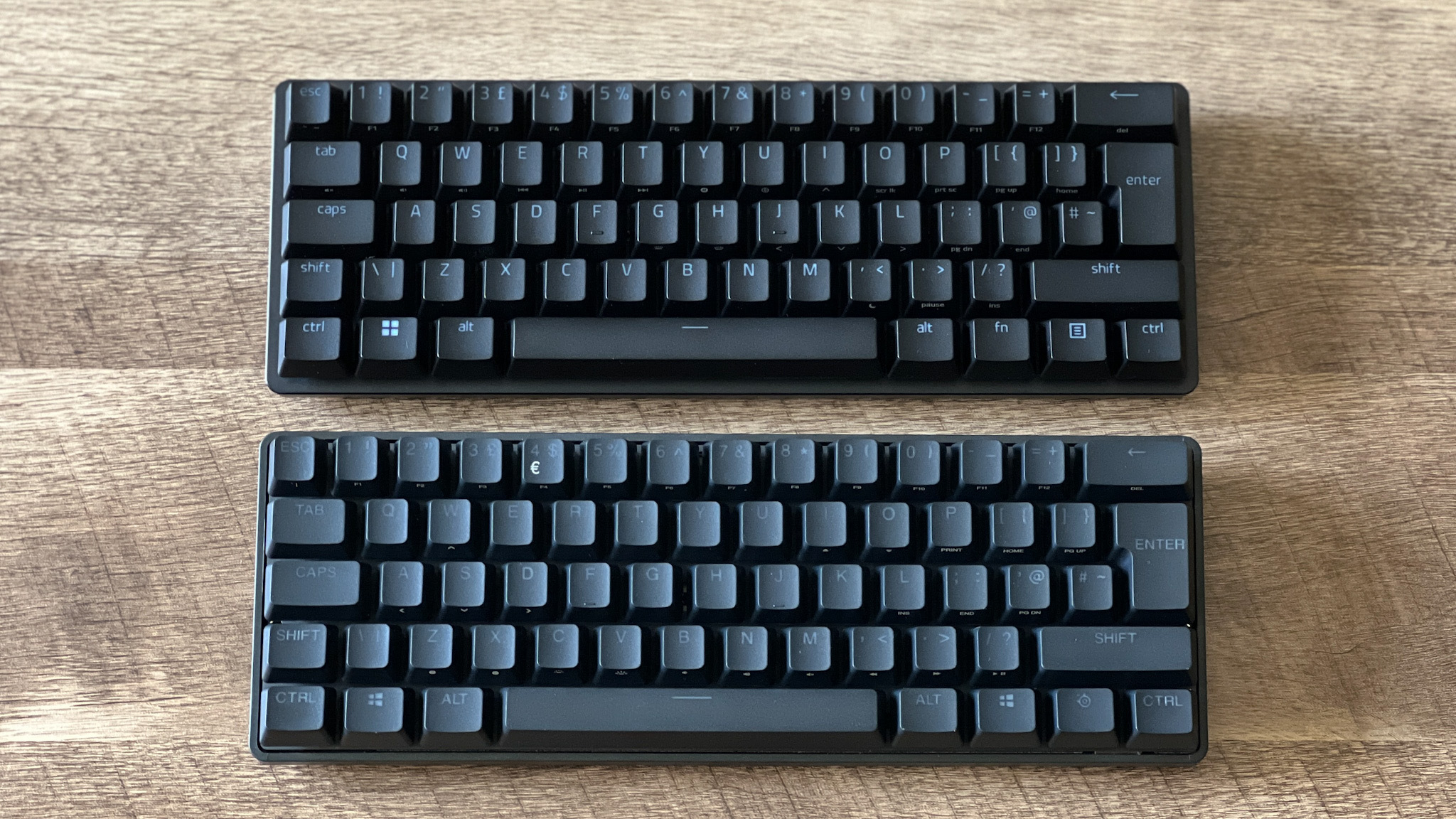
The SteelSeries Apex Pro Mini vs Razer Huntsman Mini Analog debate certainly won't be settled on looks alone. These two keyboards are borderline identical, with the same slimline 60% form factor, all-black aesthetic, and standard key layout. The only differences lie in the mapping of certain keys, a slight increase in elevation from the SteelSeries model, slightly reduced weight in Razer's option and the behaviour of RGB LEDs. However, SteelSeries does come out on top in the majority of these clashes.
It's a small note, but the SteelSeries deck does pitch itself a little higher than that of Razer's. The Huntsman was by no means uncomfortable during our testing, but when working with a smaller keyboard like this, having a good reach over all keys available to you is always a bonus.
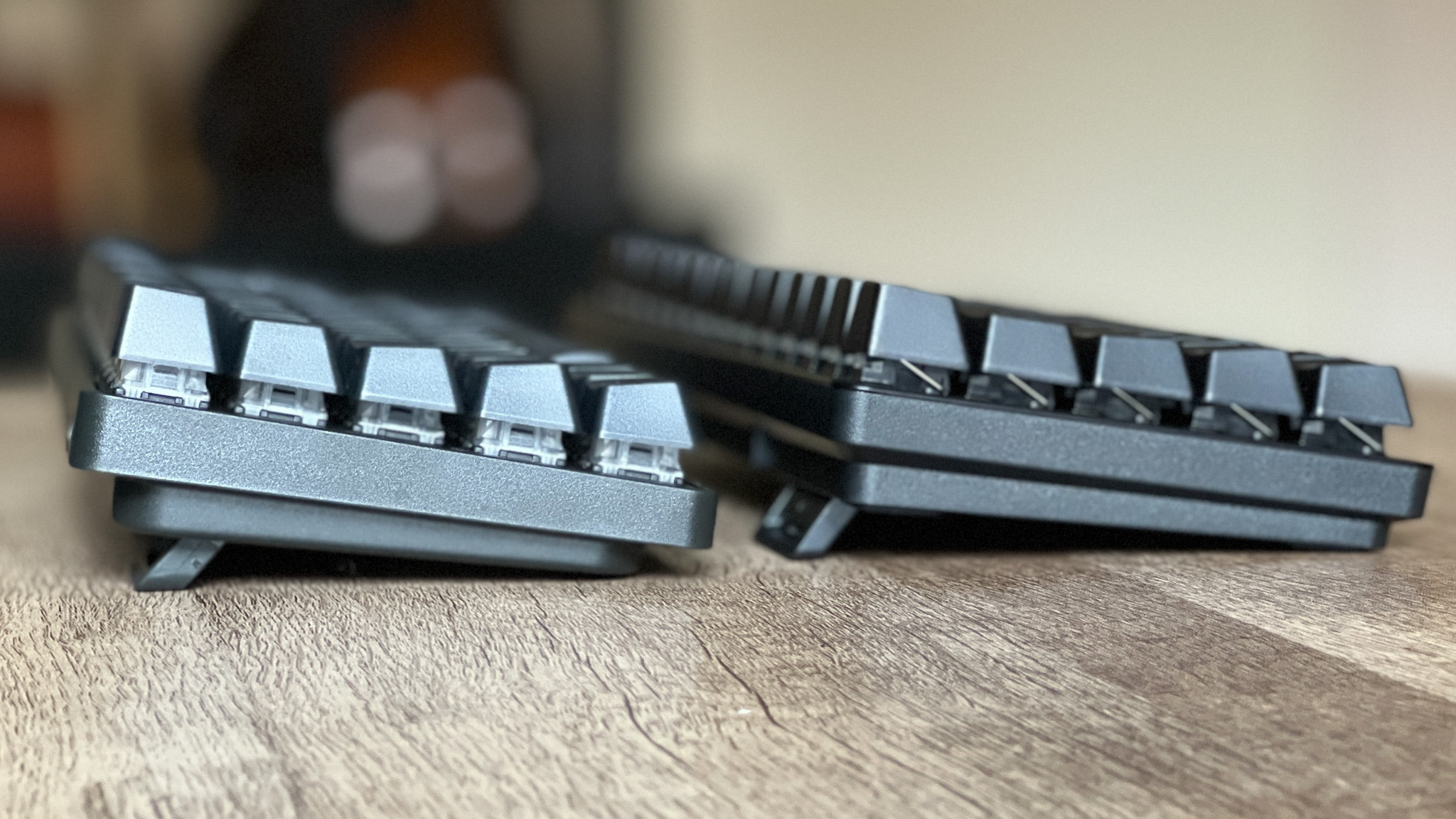
We also noticed that the extra weight on the Apex Pro Mini (610g for the wired model, 543g for the wireless) made the whole device feel a little more solid under hand. However, if you're taking your deck on the road, the lighter Razer Huntsman (523g) will offer up a better backpack experience.
Every 60% keyboard remaps its arrow keys somewhere - and some do it better than others. In this matchup, SteelSeries is the top pick. The Apex Pro Mini puts its arrows on the WASD keys to make for a far more intuitive function layer than that of Razer, which places them on the I, L, K, and J. It's just a little too far to reach comfortably and reliably with one hand, and too time-consuming to use both.
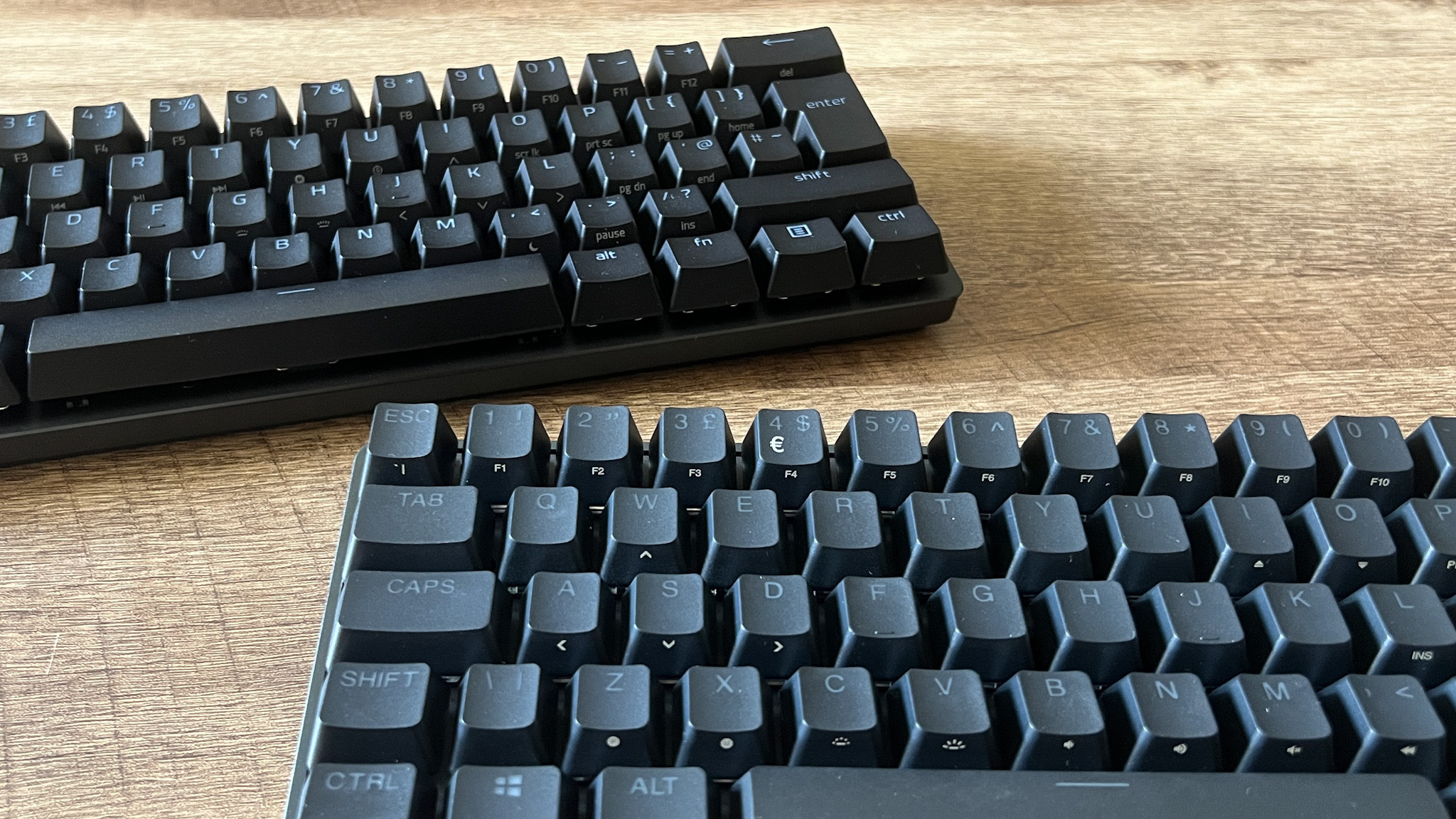
RGBs will divide opinion here. The Apex Pro Mini does have considerable light bleed around the keycaps, perfect if that the aesthetic you prefer. Meanwhile, Razer keeps things a little tighter with the vast majority of light shining just through the keycaps. The better option will come down to personal preference, however I did notice that the Apex Pro Mini wasn't lighting correctly during my testing. Certain keys would remain stuck on their stock settings despite firmware upgrades and RGB changes through the software.
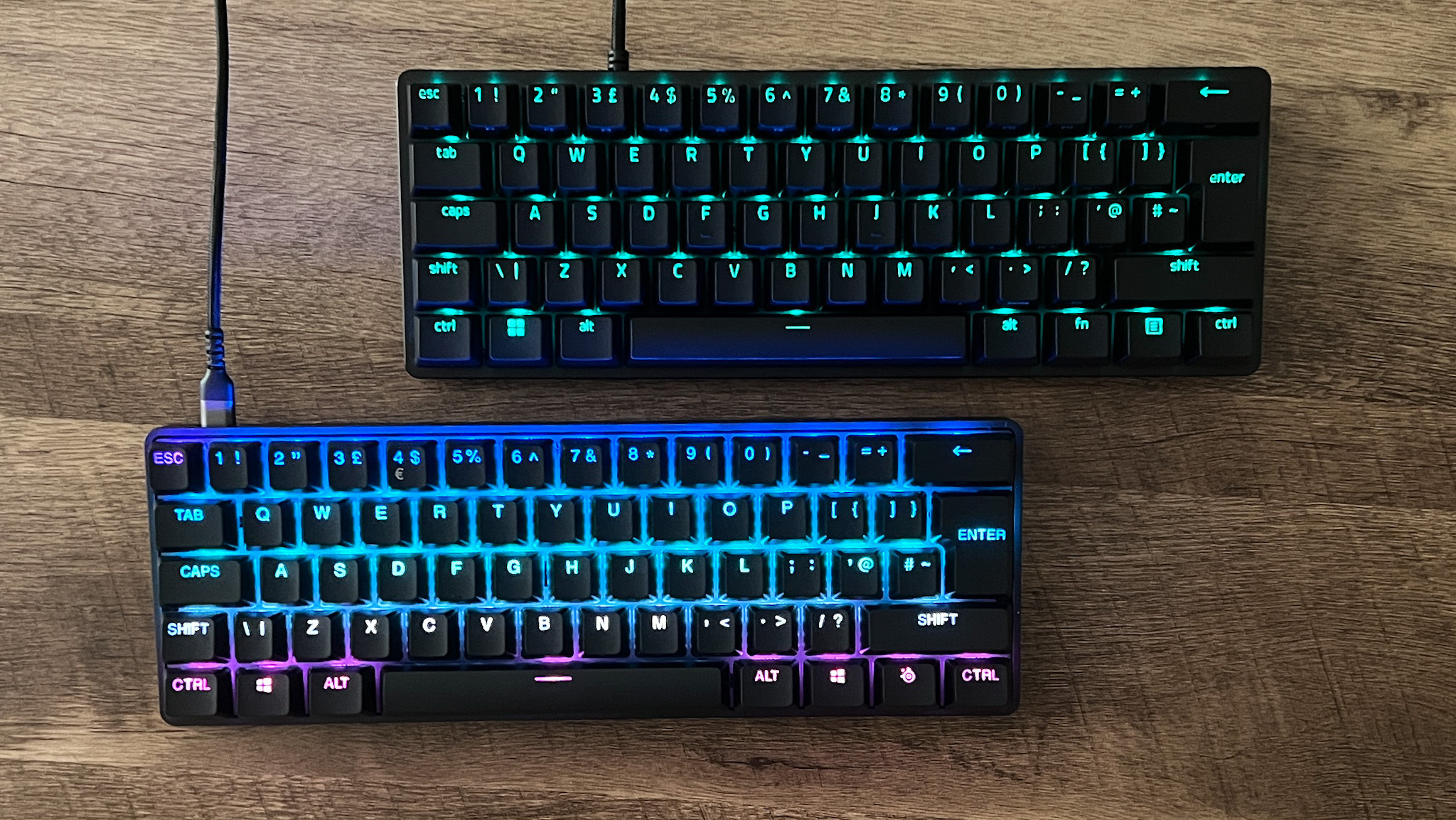
Winner - SteelSeries
Features
The basic features on offer are largely the same in both the Razer Huntsman Mini Analog and SteelSeries Apex Pro Mini. Both connect via USB Type-C, offer up to five onboard profiles for macro effects, individually backlit keys, a 1000Hz polling rate, PBT doubleshot keycaps, and standard rollover.
If you're picking up the wireless Apex model, it's worth noting that we were impressed by the out-of-the-box battery life, easily running through its reported 30 hours in our testing. However, we did also notice that it took a particularly long time to charge - with two days on the cable yielding just 50% from a dead battery.
Neither options offer a wrist rest or USB passthrough, putting both models on a level playing field in their main specs. However, the use of Razer's analog switches just pushes it over the edge here, as a major feature that simply isn't replicated in SteelSeries' offering.
Winner - Razer
Performance
Both the SteelSeries Apex Pro Mini and Razer Huntsman Mini Analog perform particularly well in-game. You're getting super low latencies from both models, with a slimline form factor that leaves plenty of space for wider mouse swings, and nicely snappy response times across the board. Similar keyspacing means we were accurate and quick with both models in Tomb Raider and Apex Legends sessions.
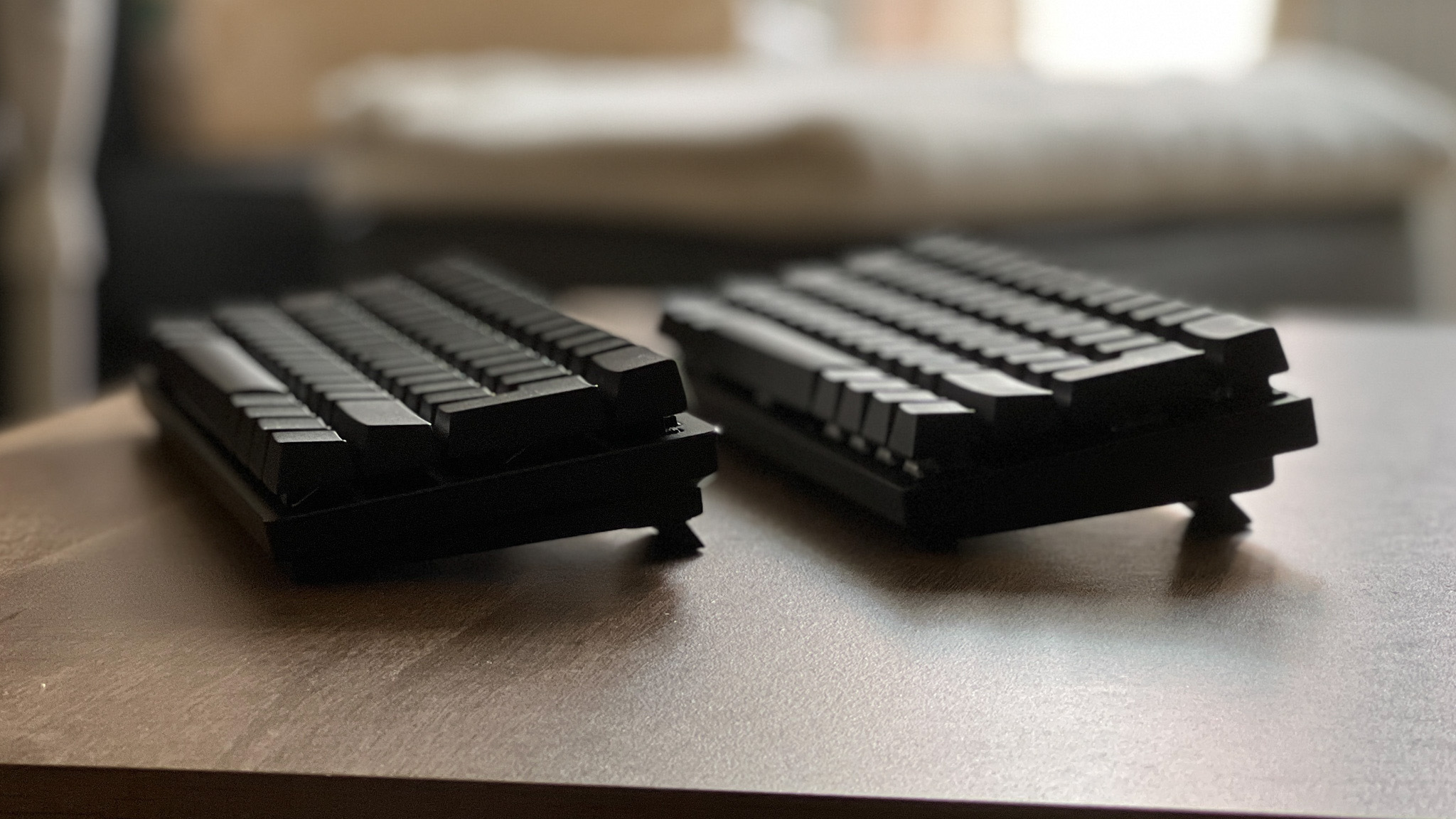
Both keyboards do take some tinkering for their adjustable switches to work as hard as possible. You'll be digging through software for a while before diving into games whichever plank you choose. Razer's Synapse software is a little more intuitive and less prone to glitchy behaviour than SteelSeries GG. However, when it comes to these decks in particular we were up and running with the Apex Pro Mini a lot quicker than we were with the Huntsman. The major caveat here, though, is that the analog switch design takes considerably longer to set up - so SteelSeries doesn't exactly win out here, it just doesn't offer the feature that requires the most attention during the setup process.
SteelSeries does offer much faster actuation, though. Competitive players will vastly prefer the wider range of actuation points available here over the more limited choice of Razer's model, and, in practice, that speed really does pay off. Of course, the Huntsman never felt sluggish during everyday use, but coming from a 0.2mm twitch-reflex switch it certainly did feel a little cumbersome in the first few rounds after switching.
We did find that the resistance level on Razer's switches did feel more satisfying overall, though SteelSeries won out in the sound department as mentioned above. However, that switch feel is certainly down to personal preference, and while heavier on the Huntsman Mini Analog, the Apex Pro Mini's keys were tighter overall.
Winner - tie
Should you buy the SteelSeries Apex Pro Mini or the Razer Huntsman Mini Analog?
Overall, we would recommend the majority of players opt for the cheaper Razer Huntsman Mini Analog. You're saving yourself $30 / £25 and getting more features for your cash - that's almost a no-brainer. However, there are some caveats to this. If you're not fussed about using variable actuation in the analog manner offered by the Huntsman, you might consider opting for the SteelSeries' wider actuation range, more ergonomic and intuitive design, and faster setup process.
Buy the Razer Huntsman Mini Analog if:
You want full analog control in your games
You prefer greater resistance behind your switches
You don't mind a louder keyboard
You like to keep RGB streamlined
Buy the SteelSeries Arctis Pro Mini if you:
Are a competitive player valuing speed
Regularly use arrow keys in work or macros
Would like full throttle RGB
Prefer a higher elevation
Don't mind spending a little extra
How we test gaming keyboards
In our quest to settle the Razer Huntsman Mini Analog vs SteelSeries Apex Pro Mini debate, we had our paws all over each keyboard. The Apex Pro Mini has been tested over the course of two weeks, acting as a primary device for all work and play, and the Huntsman Mini Analog had the same treatment on its release earlier in the year as well. With the launch of the Apex Pro Mini, we dug out the Huntsman to compare each model side by side across a series of durability and speed tests, and in our own everyday play. You can find out more about how we test gaming keyboards in our full GamesRadar Hardware Policy.
We're also rounding up all the best Razer keyboards for more inspiration, and providing you with all the best wireless gaming keyboards on the market right now as well. Or, for more switch-talk, check out our guide to the best hot-swappable keyboards.

Managing Editor of Hardware at GamesRadar+, I originally landed in hardware at our sister site TechRadar before moving over to GamesRadar. In between, I've written for Tom’s Guide, Wireframe, The Indie Game Website and That Video Game Blog, covering everything from the PS5 launch to the Apple Pencil. Now, i'm focused on Nintendo Switch, gaming laptops (and the keyboards, headsets and mice that come with them), PS5, and trying to find the perfect projector.


